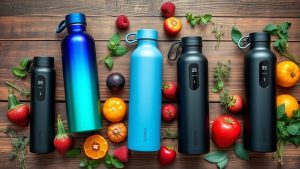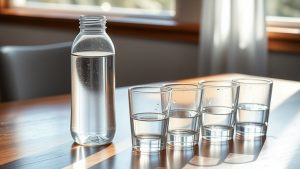
Experts recommend drinking about 8 to 13 cups of water daily, which translates to roughly 2 to 3 water bottles depending on their size. Your hydration needs can vary based on factors like age, weight, activity level, and climate conditions. It's important to listen to your body's thirst signals and adjust accordingly. By keeping a water bottle nearby, you can easily track your intake and maintain ideal hydration. Learn about other strategies to support your hydration needs.
How much water should you really be drinking each day? It's a common question, and the answer isn't as straightforward as you might think. The National Academy of Medicine recommends about 13 cups (104 oz) for men and 9 cups (72 oz) for women. However, these numbers serve as general guidelines rather than strict targets, as individual hydration needs can vary based on several factors.
Your age, sex, weight, climate, and activity level all play a role in determining how much water you should consume. For instance, if you live in a hot climate or engage in intense physical activity, you'll likely need to drink more. Even the popular "8 glasses a day" rule lacks strong scientific backing, so relying on it alone mightn't meet your unique needs. Some experts suggest a higher intake, recommending 15.5 cups (3.7 L) for men and 11.5 cups (2.7 L) for women.
Hydration needs vary by age, sex, weight, climate, and activity level; one size doesn't fit all.
Weight-based calculations offer a practical approach, suggesting that you drink half your weight in ounces daily. If you weigh 160 pounds, that means about 80 ounces of water. Remember, though, that around 20% of your daily water intake can come from the food you eat, particularly fruits and vegetables, which can help you reach your hydration goals.
Water is essential for your body—making up about 60% of your weight. When you don't drink enough, you risk dehydration, which can lead to serious health issues, especially if you're an older adult or have chronic conditions. Listening to your body's thirst signals is important; that's your primary indicator that you need more water.
In practical terms, tracking your intake can be easier if you use water bottles. Many people find it helpful to use a 24 oz or 32 oz bottle and keep track of how many times they refill it throughout the day. Small adjustments in your routine, like keeping a bottle nearby while you work or setting reminders to drink, can help you meet your daily hydration needs.
Your hydration requirements may increase during pregnancy and breastfeeding, with recommendations of about 10 cups (80 oz) and 13 cups (104 oz) respectively. Additionally, if you have certain medical conditions or are an athlete, you may need to adjust your fluid intake to stay adequately hydrated.
Finally, it's important to take into account the environmental factors that influence your hydration needs. Extreme temperatures can increase fluid requirements, so if you travel to a different climate, be sure to adjust your water intake accordingly.
Conclusion
In the end, staying hydrated is like nurturing a blooming garden; your body thrives when it receives the right amount of water. Experts typically recommend drinking about eight 8-ounce glasses, or roughly two water bottles, each day. However, individual needs can vary based on factors like activity level and climate. Listen to your body, and make hydration a daily habit. When you do, you'll cultivate not just physical health, but also mental clarity and energy.



